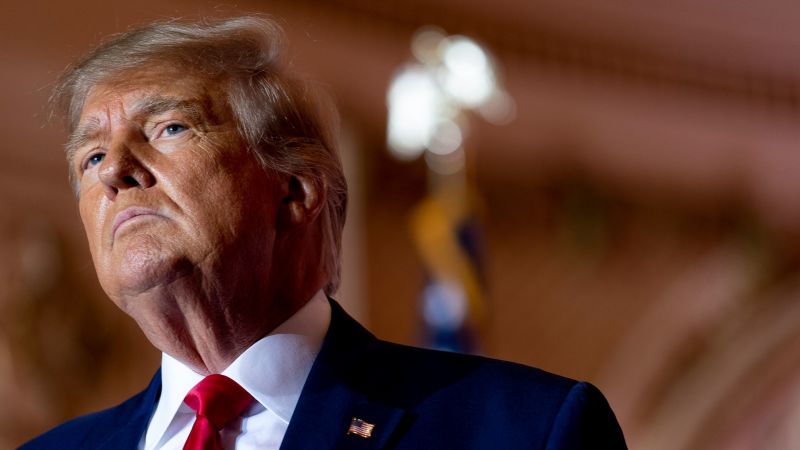CNN
—
Former President Donald Trump is giving it another go. He announced last week that he’s trying to become only the second man (after Grover Cleveland) to be elected to non-consecutive terms as US president.
Trump’s move comes at a time when his political brand is at its weakest point since his first presidential bid in 2015-2016. He does remain a force to be reckoned with in GOP circles, and the news that the Justice Department has appointed a special counsel to oversee investigations related to the former president could elicit a rally-around-Trump effect among Republicans. Nevertheless, it’s clear his power within the party has diminished following the 2022 midterm elections.
The easiest way to tell that Trump’s standing isn’t what it once was is to look at the reaction to his 2024 presidential announcement. Many Republican elected officials and conservative media personalities gave it a big yawn.
Trump’s announcement earned him the support of very few elected officials on Capitol Hill. It was much more reminiscent of his first bid in 2015-2016, when Trump initially drew little support from lawmakers in Congress. The difference this time, of course, is that Trump is the former leader of the party whom most Republican members of Congress had endorsed in 2020 instead of a political neophyte like he was seven years ago.
Instead, there seems to be about as many senators (one) already backing Florida Gov. Ron DeSantis as there are for Trump. This is important because endorsements from party officials have historically been correlated with presidential primary success.
Will DeSantis run in 2024? Politico reporter goes over some factors
I should note that the lack of endorsements didn’t stop Trump in 2016, and it may not this time either.
Trump’s first bid may have been an aberration, though. He was facing off against more than a dozen competitors who split support among the conservative political class. This is especially a problem in Republican primaries, which tend to be winner-take-all (or most) affairs, unlike Democratic primaries, which award delegates proportionally. Trump needed well less than half of the GOP vote to accumulate a lot of delegates quickly in 2016.
He may not get the same divided opposition in the 2024 cycle. The only obvious competitor to Trump at this point is DeSantis.
The Florida governor’s rise is perhaps the most important development in the 2024 Republican field. Trump is still ahead in a number of national primary polls, but DeSantis is polling better in early national polls than any non-Trump candidate did for much of the 2016 primary cycle.
In his home state of Florida, DeSantis is outright beating Trump in almost every poll. In CNN’s exit poll of 2022 midterm voters in Florida, more Republicans wanted DeSantis to run in 2024 than they did Trump.
DeSantis’ Florida advantage is notable for a number of reasons, besides the fact that the state contains a boatload of Republican delegates, who will likely be allocated winner-take-all.
First, Florida is Trump’s home state too, and it’s the only place where the two men are on equal footing in terms of name recognition. DeSantis’ lead is a sign that as Republicans nationwide get to know him better, they could move toward him. (DeSantis tends to have a higher favorable rating than Trump nationally among Republicans who are familiar with both men.)
Second, Trump won Florida in the 2016 primaries against home-state Sen. Marco Rubio. The fact that DeSantis is now besting him there in the polls is arguably an indication that Trump is in a weaker position than he had been in 2016.
But Trump’s problems go beyond just party officials and polls. Trump was able to defy conventional wisdom in 2016 because he received an outsize amount of media attention. He basically crowded out the competition.
This time, it won’t be so easy. I’ve pointed out previously that DeSantis has shown a knack for generating a lot of media attention on Fox News. Trump’s name wasn’t mentioned until page 26 of the Rupert Murdoch-run New York Post (whose editorial page leans to the right) on the day after his 2024 announcement. Murdoch leads the company that owns Fox News as well.
And if Trump wins the primary, he’ll still have to win a general election. That won’t be easy, as the 2022 midterms showed.
I noted last week that Trump’s presence was one of the major reasons that Democrats did surprisingly well in the midterm elections. By being in the headlines so much and acting like a quasi-incumbent, Trump helped to nullify what is normally a major advantage for the opposition party in midterm elections with an unpopular incumbent in the White House.
Now, you could have envisioned a universe in which Trump’s larger-than-life personality may have been helpful if he were popular.
Instead, Trump’s favorable rating is at one of its lowest points in the last five years: 39%, according to the 2022 exit poll. That compares with a 46% favorable rating in the 2020 exit poll and a 45% job approval rating in the 2018 exit poll.
In a presidential election in which Trump’s name is actually on the ballot, you could imagine his unpopularity being even more of a factor.
We already know from history that it won’t be easy for Trump. While incumbent presidents (like Joe Biden) are at a disadvantage in midterms, they benefit from their incumbency in presidential elections. Elected incumbents win more than 60% of the time when they run for another term.
The bottom line is that Trump’s got an uphill climb ahead of him for 2024 – both in a GOP primary and in a general election. He can certainly win a second term, but the odds are currently against him.



















